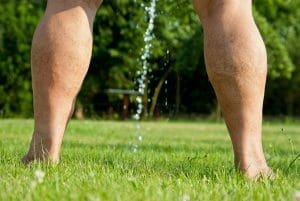Your kids may have developed the habit of peeing on the lawn, or you relieve yourself on your grass while stumbling home after a night out with friends.
The consequences of these actions on the grass are sure to make you panic, wondering if the lawn you spent so much time working on is ruined and attempting to answer the question, does human urine kill grass?
Human urine can kill grass, but its effects will depend on the urine’s concentration, soil’s PH, the urine content, and how often human urine gets on your grass. Your grass may benefit from well-diluted human urine, providing nutrients.
The benefits of human urine to grass are why gardeners and farmers have been using it for many years. However, before exploring human urine as grass fertilizer, you ought to know its effects and how to use it safely.
Keep reading to find out.
Can Human Urine Kill Grass?
Human urine can kill grass if undiluted, applied several times with about 3 applications, enough to burn the grass and cause severe damage to your lawn.
In addition, while human urine generally has a similar composition, some conditions like taking prescription drugs, high sodium intake, and dehydration can make your urine bad for the lawn.
To figure out if human pee will kill your grass or provide amino acids and nutrients, you must factor in the source of the urine and when and where it was collected.
What Happens When You Pee On Grass?
You will either supply your lawn with essential nutrients or kill your grass when you pee on it, with the outcome depending on your urine’s characteristics. The urine needs to be properly diluted (you must be well hydrated), contain low sodium, and be healthy for your grass to benefit from your urine.
Human urine has beneficial nutrients that commercial fertilizers typically contain, making it useful for your grass if applied correctly. For instance, it contains small quantities of potassium and phosphorus and a moderate quantity of nitrogen.
In addition, human urine boosts the PH slightly, which some grass will appreciate. It is also an excellent uric acid source that helps hasten the dead plants’ decomposition and eliminate mildew, mold, and fungal disease.
Also read: Will baking soda neutralize dog urine on grass
However, don’t celebrate the discovery of a cheap and naturally produced source of lawn fertilizer just yet because human urine has a high content of salt. If you don’t dilute urine before applying it to your lawn, the salts will draw moisture from the grass, leaving behind hideous dead spots, thus lowering your lawn’s appeal and health.
Therefore, continuously hosing your lawn with urine is counterproductive. In such a case, you are better off sticking with traditional lawn food to encourage the growth of your grass and maintain your yard’s overall health.
Can Human Urine Kill Grass And Weeds?
Undiluted human urine can kill weeds and grass but becomes a fertilizer once you dilute it. Below is how undiluted human urine can kill weeds:
1. Uric Acid
Undiluted uric acid can help kill weeds and keep your yard from creeping between paving stones or into mulched beds. This acid will burn and break down weeds in your lawn upon coming in contact with these unwanted plants.
The first urine you produce in the morning or after an extended period of dehydration will contain high levels of uric acid. Therefore, this should be what you collect if you want to kill weeds with human urine.
2. Excess Nitrogen
Human urine in an undiluted form has a lot of nitrogen which can be detrimental to grass and weeds. Too much of this nutrient burn the weeds and grass, killing them.
3. It Can Create Weed-Free Compost
Adding undiluted human urine to your lawn can render the soil in that area unsuitable for sustaining plants until the build-up of these nutrients goes down. Adding undiluted urine to a pile of compost forms nutrient-dense, weed-free compost.
How To Clean Up Human Urine On Grass
Since human urine is only harmful to your grass in a concentrated form, the best way to make it useful and clean it up is to dilute it. In addition, since you cannot mop the urine out of your grass, not that you would want to anyway, you are left with watering the lawn to dilute the human urine and protect your grass from its effects.
Watering the lawn should save your lawn from human urine regardless of the base contents in the urine and its type.
However, keep in mind that your soil’s PH may be affected if a generous amount of urine is introduced into the yard or unhealthy urine. If that’s the case, you will need to test the soil and correct the PH if necessary a week after the incident.
How To Safely Use Urine In Lawn
Human urine applied directly to the lawn may be too strong, causing the grass to die from excess nitrogen and concentrated uric acid. Fortunately, you can avoid this by diluting the urine before application.
The usual dilution ratio is 20:1 for a well-hydrated person, meaning you need to add 20 parts water to one part urine. However, how much you will need to dilute urine will vary based on the urine’s initial dilution.
Add human urine to your lawn early in the morning when dew is still present to dilute it further and keep it from sticking to the grass blades or leaves. If the urine is to act as fertilizer, don’t apply other forms of fertilizers because that will supply excess potassium, nitrogen, and phosphorus to your yard.
You are better off adding an extra neutralizing substance like wood ash to the human urine solution before application if you live in an arid region or are coming off extended dry weather.
Final Remarks
From this post, it’s clear that the usefulness or harm of human urine is felt based on how it’s used and the composition of the urine. You can reap its benefits (supplying your grass with nutrients) if used in a diluted state and also prevent the adverse effects by diluting it.
Reference
- SSWM (Sustainable Sanitation and Water Management) – Urine Fertilisation (Small-Scale)

Hey there, I’m Derek Schew, a writer for Lawnholic.com, where we cover everything and anything related to lawns. As someone who’s spent countless hours tending to my own lawn, I’m passionate about sharing my knowledge and helping others achieve the perfect yard. From lawn care tips to product reviews, I’m committed to providing our readers with the most accurate and up-to-date information available. So whether you’re a seasoned lawn enthusiast or just getting started, I invite you to join our community and discover the joys of a lush, green lawn.

